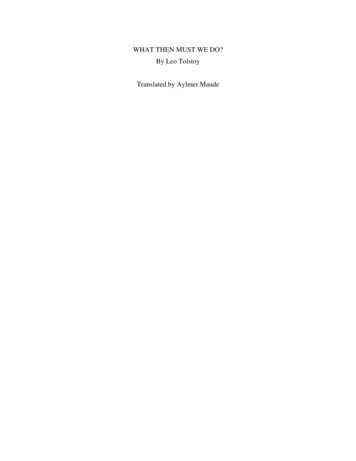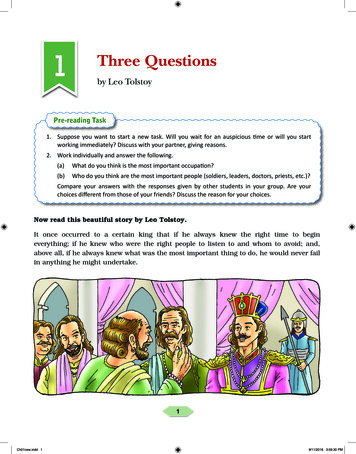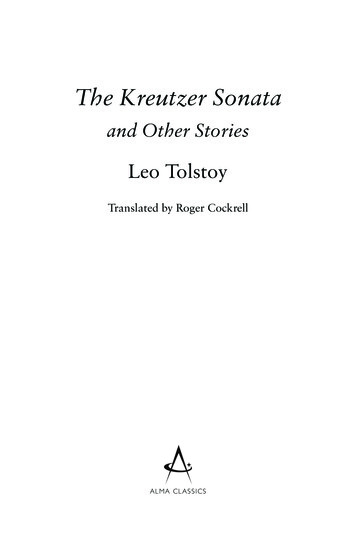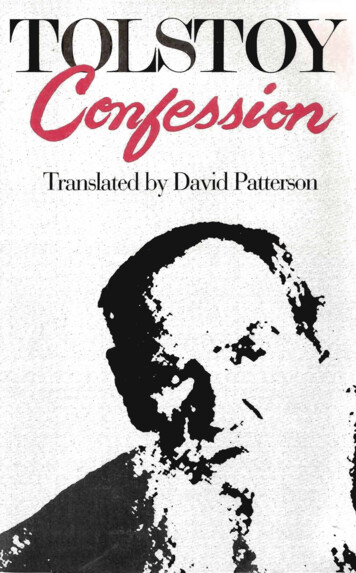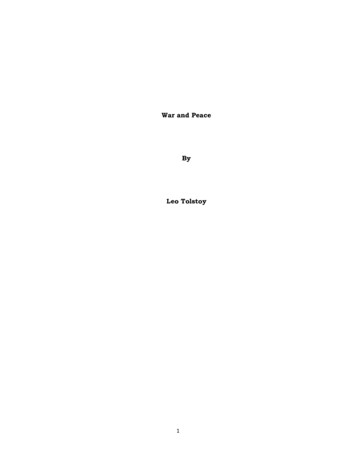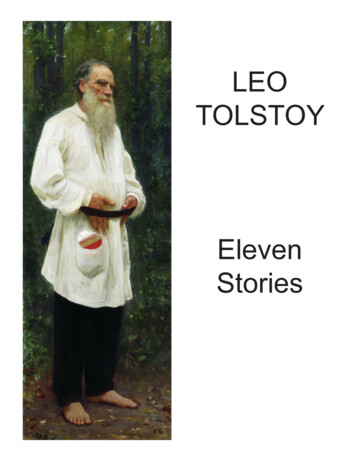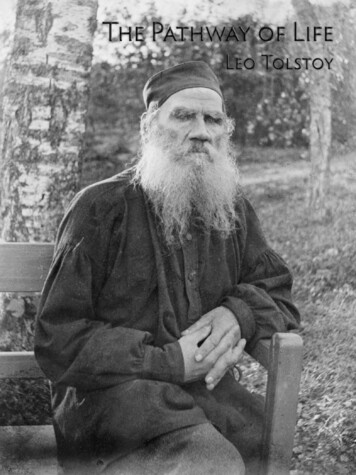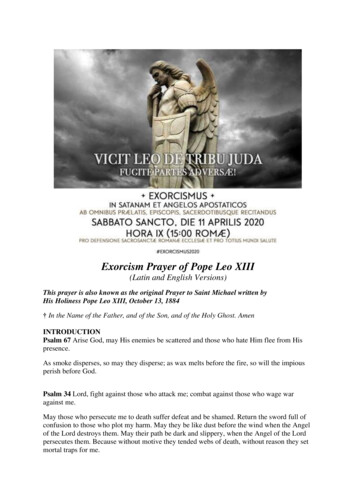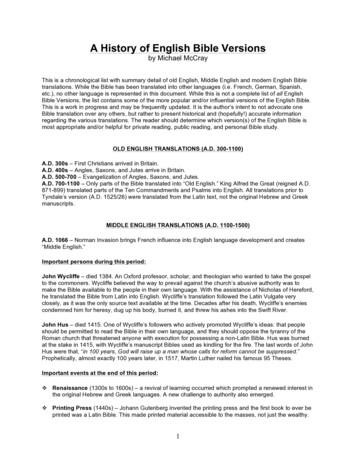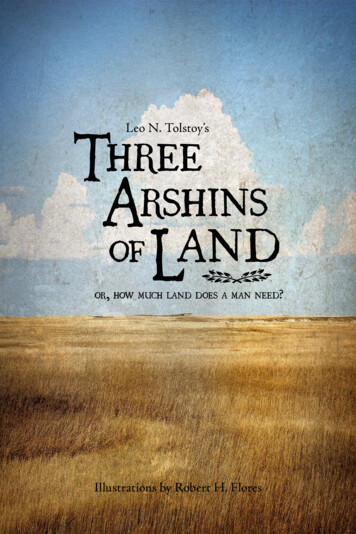
Transcription
Leo N. Tolstoy’sIllustrations by Robert H. Flores1
This booklet is dedicated to Leo Tolstoy’s Life and Legacy.Three Arshins of Land or, How Much Land Does a Man Need? is in the Public Domain.Originally published in 1886 and written by Leo N. Tolstoy (1828-1910).Illustrations and this compilation is Copyright 2008, 2017 Robert H. FloresAll rights reserved. BibleArt Books and the shepherd logo are trademarks of RobertH. Flores. This story is a work of fiction. Any resemblance to actual persons in thisbook, is purely coincidental. This booklet is to be freely distributed in digital formatfree of charge. Any other distribution is strictly prohibited without the prior writtenpermission of the publisher.Scripture is from the King James VersionPrinted in the United States of America8 7 6 5 4 3 2 1 17 18 19 20 21 22www.bibleartbooks.com2
A woman came from the city, to visit her younger sister in the country. Theelder was a city merchant’s wife; the younger, a country mujik’s. The two sistersdrank tea together and talked. The older sister began to boast—to praise up herlife in the city; how she lived roomily and elegantly, and went out, and how shedressed her children, and what rich things she had to eat and drink, and howshe went to drive, and to walk, and to the theater.The younger sister felt affronted, and began to deprecate the life of the merchant, and to set forth the advantages of her own,—that of the peasant.“I wouldn’t exchange my life for yours,” says she. “Granted that we livecoarsely, still we don’t know what fear is. You live more elegantly; but you haveto sell a great deal, else you find yourselves entirely sold. And the proverb runs,‘Loss is Gain’s bigger brother.’ It also happens, today you’re rich, but tomorrowyou’re a beggar. But our mujiks’ affairs are more reliable; the mujik’s life is meager, but long; we may notbe rich, but we haveenough.”The elder sister began to say:“Enough,—I shouldthink so! So do pigs andcalves! No fine dresses,no good society. Howyour goodman works!How you live in thedunghill! And so youwill die and it will be thesame thing with your children.”“Indeed,” said the younger, “our affairs are all right. We live well. We truckle to no one, we stand in fear of no one. But you in the city all live in the midst oftemptations; today it’s all right; but tomorrow up comes some improper person,I fear, to tempt you, and tempts your khozyaïn either to cards, or to wine, or towomen. And everything goes to ruin. Isn’t it so?”Pakhom, the “goodman,” was listening on the oven1, as the women discussed.“That’s true,” says he, “the veritable truth. As we peasants from childhoodturn up mother earth, so folly stays in our head, and does not depart. Our onetrouble is,—so little land. If I only had as much land as I wanted, I shouldn’t beafraid of any one—even of the Devil.”The women drank up their tea, talked some more about dresses, put awaythe dishes, and went to bed.But the Devil was sitting behind the oven; he heard everything. He wasdelighted because the peasant woman had induced her husband to boast with3
her; he had boasted that, if he had land enough, the Devil could not get him!“All right,” he thinks; “you and I’ll have to fight it out. I will give you a lot ofland. I’ll get you through the land.”Pakhom’s neighbor was a lady who owned a little estate. She had one hundred and twenty dessyatins2 . For a long time she had never harmed the peasants in any way, living in peace with them. But lately she had installed a retiredsoldier as superintendent, and he worried the peasants with fines. No matterhow careful Pakhom was, a horse would invade his neighbor’s oat-field, or hiscow would stray into her garden or the calves into the pasture. There was a finefor everything.Pakhom paid, growled, beat his family, and in the course of the summerlaid up much sin upon his soul because of the superintendent. He found reliefonly by keeping his cattle in the yard. He begrudged the fodder, but he was thusspared much anxiety.In the winter the rumor spread that his neighbor meant to dispose of herland and that the superintendent thought of buying it. When the peasantsheard this they were greatly troubled.If the superintendent becomes the master, they judged, there will be no endto the fines.They importuned the lady to sell the land to the community and not to thesuperintendent. As they promised to pay her more than the latter, she agreed.The peasants held a meeting, then met again, but came to no understanding.The Devil sowed dissensions. Finally they decided that each should buy landaccording to his means, and the owner consented again.When Pakhom heard that a neighboring peasant had bought twentydessyatins of the land, with time extension to pay one-half of the purchaseprice, he became envious. “They’ll sell the whole land, and I’ll go empty-handed.” He consulted with his wife. “The peasants are buying land. We must getten dessyatins,” he said. They considered how to arrange the matter.They had saved a hundredrubles3. They sold a foal, onehalf of their beehives, hired theson out as a laborer, and thussucceeded in scraping one-halfof the money together.Pakhom looked over atract of land of fifteen dessyatins, with a grove, and negotiated with his neighbor. Hecontracted for the fifteendessyatins and paid his earnest money. Then they drove4
to the city and made out the deed. He paid one-half of the money and agreed topay the rest in two years. Pakhom now had land.He borrowed money from his brother-in-law, bought seed and sowed thepurchased land. Everything came up beautifully. Inside of a year he was able topay off his debts to the neighbor and to his brother-in-law. Pakhom was now alandowner in his own right. He cultivated his own ground, and cut his own pasturage. He was overjoyed. The grass had another look; different kinds of flowers seemed to bloom onit. Once upon a time thisland had looked to him thesame as any other, but nowis was a specially blessedpiece of God’s earth.Pakhom was enjoying life. Everything wouldbe well now if the peasantsonly left his fields alone, ifthey did not let their cattle graze on his meadows.He admonished them in afriendly fashion. But theydid not desist from drivingtheir cows on his land, andat night the strangers’ horses invaded his grain. Pakhom chased them and for atime did not lay it up against the peasants. Finally, however, he lost patience andmade a complaint to the court. He knew very well, tho, that necessity forced thepeasants to do this, not love of wrongdoing. Still, he thought, he would have toteach them a lesson, or they would graze his land bare. A good lesson might beuseful.With the help of the court he taught them more than one lesson; more thanone peasant was fined. And so it happened that the peasants were in no amiable mood towards him and were eager to play tricks on him. He was soon atloggerheads with all his neighbors. His land had grown, but the confines of thecommunity seemed all too narrow now.One day, as he was seated at home, a traveling peasant asked for a lodging.Pakhom kept him over night, gave him, plenty of meat and drink, inquiredwhere he came from and talked of this and that. The peasant related that hewas on the way from the lower Volga region, where he had been working. Manypeasants had settled there. They were received into the community and tendessyatins were allotted to each. Beautiful land! It made the heart feel glad tosee it full of sheaves. A peasant had come there naked and poor, with emptyhands, and now he had fifty dessyatins under wheat. Last year he sold his one5
crop of wheat for five thousand rubles.Pakhom listened with delight. He thought: why plague oneself in thiscrowded section, if one can live fine elsewhere? I will sell my land and propertyand from the proceeds I will buy land on the lower Volga and start a farm. Herein this crowded corner there is nothing but quarreling. I will go and look thingsover for myself.When summer came he started on his journey. He went by boat to Samaraon the Volga, then four hundred versts4 on foot. When he arrived at his journey’s end he found things even as they had been reported to him. Ten dessyatinswere allotted to each person, and the mujiks5 were glad to receive the strangerinto the community. If a man brought money with him he was welcome andcould buy as much land as he pleased. Three rubles a dessyatin was the price forthe best land.When Pakhom had investigated everything, he returned home, sold hisland at a profit, sold his homestead and cattle, took leave from his community,and, when the spring came around, he journeyed with his family to the newlands.When he reached his destination with his family, Pakhom settled in a largevillage and registered in the community. Having treated the elders, he receivedhis papers in good order. He had been taken into the community, and, in addition to the pasturage, land for five souls—fifty dessyatins in all—were allottedto him. He built a homestead and bought cattle. His allotment was twice aslarge as his former holdings. And what fertile land! He had enough of everything and could keep as many head of cattle as he wished.In the beginning, while he was building and equipping his homestead, hewas well satisfied. But after he had lived there a while he began to feel thatthe new lands were too narrow. Thefirst year Pakhom sowed wheat onhis allotted land. It came up bountifully, and this created a desire tohave more land at his disposal. Hedrove over to the merchant andleased some land for a year. Theseed yielded a plentiful harvest. Unfortunately the fields were quite farfrom the village and the gatheredgrain had to be carted for a distanceof fifteen versts. He saw peasanttraders in the neighborhood owning dairies and amassing wealth.How much better were it, thoughtPakhom, to buy land instead of leas6
ing it, and to start dairying. That would give mea well-rounded property,all in one hand.Then he came acrossa peasant who owned fivehundred dessyatins ofland, but found himselfruined and was eager todispose of his property ata low figure. They closeda deal. Pakhom was topay fifteen hundred rubles, one-half down, onehalf later.About this timea traveling merchantstopped at Pakhom’sfarm to feed his horses. They drank tea and spoke of this and that. The merchant told him that he was on his way home from the land of the Bashkirs 6 .He had bought land there, about five thousand dessyatins, and had paid onethousand rubles for it. Pakhom made inquiries. The merchant willingly gaveinformation.“Only one thing is needful,” he explained, “and that is to do some favor totheir chief. I distributed raiment and rugs among them, which cost me a hundred rubles, and I divided a chest of tea between them, and whoever wantedit had his fill of vodka. I got the dessyatin land for twenty copeks. Here is thedeed. The land along the river and even on the steppes is wheat-growing land.”Pakhom made further inquiries.“You couldn’t walk the land through in a year,” reported the merchant. “Allthis is Bashkir-land. The men are as simple as sheep; one could buy from themalmost for nothing.”And Pakhom thought: “Why should I buy for my thousand rubles five hundred dessyatins of land and hang a debt around my neck, while for the sameamount I can acquire immeasurable property.”Pakhom inquired the way to the land of the Bashkirs. As soon as he hadseen the merchant off, he made ready for the journey. He left the land and thehomestead in his wife’s charge and took only one of his farmhands along. In aneighboring city they bought a chest of tea, other presents, and some vodka, asthe merchant had instructed them.They rode and rode. They covered five hundred versts and on the seventhday they came into the land of the Bashkirs and found everything just as the7
merchant had described. On the riverside and in the steppes the Bashkirs livein kibitkas7. They do not plow. They eat no bread. Cows and horses graze onthe steppes. Foals are tied behind the tents, and mares are taken to them twicedaily. They make kumyss8 out of mare’s milk, and the women shake the kumyssto make cheese. The men drink kumyss and tea, eat mutton, and play the fluteall day long. They are all fat and merry, and idle the whole summer through.Ignorant folk, they cannot speak Russian, but they were very friendly.When they caught sight of Pakhom, the Bashkirs left their tents and surrounded him. An interpreter was at hand, whom Pakhom informed that he hadcome to buy land. The Bashkirs showed their joy and led Pakhom into theirgood tent. They bade him sit down on a fine rug, propped him up with downycushions and treated himto tea and kumyss. Theyalso slaughtered a sheepand offered him meat.Pakhom fetched from histarantass the chest of teaand other presents anddistributed them amongthe Bashkirs. The Bashkirs were overjoyed. Theytalked and talked amongthemselves and finallythey ordered the interpreter to speak.“They want me to tellyou,” said the interpreter,“that they have taken a liking to you. It is our custom to favor the guest in allpossible ways and to return gifts for gifts. You have given us presents, now tellus what do you like of what we have so that we may give you presents also?’“Most of all I like land,” replied Pakhom. “We’re crowded where I am athome and everything is already under the plow. But you have good land andplenty of it. In all my born days I have never seen land like yours.”The Bashkirs were now talking again, and all at once it looked as thoughthey were quarrelling. Pakhom asked why they were quarrelling. The interpreter replied:“Some of them think that the chief should be consulted, and that no agreement ought to be made without him; but the others say it can be done withoutthe chief just as well.”While the Bashkirs were yet arguing, a man with a hat of fox fur enteredthe tent. Everybody stopped talking and they all rose.“This is the chief.”8
Pakhom immediately produced the best sleeping robe and five pounds oftea. The chief accepted the presents and sat down in the place of honor. TheBashkirs spoke to him. He listened, smiled and addressed Pakhom in Russian.“Well,” he said, “that can be done. Help yourself, wherever it suits you.There is plenty of land.”“How can I do this, tho,” thought Pakhom. “Some official confirmation isnecessary. Otherwise they say today, help yourself, but afterwards they maytake it away again.” And he said:“Thank you for these good words. You have plenty of land, and I need butlittle. Only I must know what land belongs to me. It must be measured and Ineed some sort of a confirmation. For God’s will rules over life and death. Youare good people and you give me the land; but it may happen that your childrenwill take it away again.”The chief laughed. “Surely this can be done,” he agreed. “A confirmation sostrong that it cannot be made stronger.”Pakhom replied: “I heard that a merchant had been here among you. Yousold him land and gave him a deed. I should like to have it the same way.”The chief immediately understood. “This too can be done,” he exclaimed.“We have a writer. We will drive to the city and have the seals put on.”“We have but one price: one thousand rubles a day.”Pakhom failed to comprehend what sort of measure a day would be. “Howmany dessyatins will that make?”“That we cannot figure out. For one day we sell you as much land as you canwalk around in one day. The price of one day is one thousand rubles.”Pakhom looked surprised. “One can walk around a lot of land in one day,”he said.The chief smiled.“Everything will beyours, but on one condition. If in the courseof the day you do notreturn to the place youstart from, your moneyis lost.”“But how can it benoted how far I havegone?”“We will stay right atthe starting point. Ourlads will ride behindyou. Where you com9
mand they will drive in a stake. Then we shall mark furrows from stake tostake. Choose your circle to suit yourself, only before sunset be back at the spotwhere you started from. All the land that you walk around shall be yours.”Pakhom assented. It was decided to start early in the morning. They conversed for a while, drank kumyss and tea and ate more mutton. When the nightset in Pakhom retired to sleep and the Bashkirs dispersed. In the morning theywere to meet again in order to journey to the starting point.Pakhom could not fall asleep. He had his mind on the land. What mannerof things he thought of introducing there! “A whole principality I have beforeme! I can easily make fifty versts in one day. The days are long now. Fifty verstsencompass ten thousand dessyatins. I will have to knuckle down to no one. I’llplow as much as may suit me; the rest I’ll use for a pasturage.”The whole night through he was unable to close his eyes; only towardsmorning he dozed restlessly. Hardly had be begun to doze when he saw a vision. He was lying in his kibitka and heard laughter outside. To see who it wasthat laughed he stepped out of the kibitka and found the chief of the Bashkirs.He was holding his hands to his sides and fairly shaking with laughter. Pakhomapproached him in his dream to find out why he was laughing, but now, insteadof the Bashkir, he saw the merchant who had come to his farm and told him ofthis land. Just as he wanted to ask him how long he had been there, he saw thatit was no longer the merchant but that mujik who had called on him at his oldhomestead and told him of the lower Volga region. And now again it was nolonger the mujik but the Devil himself, with horns and hoofs, and he laughedand stared at one spot. What is he looking upon? wondered Pakhom; why is helaughing? In his dream he saw a man lying outstretched, barefoot, clad only ina shirt and pair of trousers, with his face turned upward, white as a sheet. Ashe looked again to see what manner of man it was, he saw clearly that it was hehimself.He awoke with the horror of it. What dreadful things one sees in a dream!He looked about. Itwas commencing todawn. The peoplemust be roused. Itwas time to journeyto the starting place.Pakhom arose, wakedhis servant, who hadbeen sleeping in thetaran-tass, harnessedthe horses and wentto wake the Bashkirs.“It is time,” he said,10
“to travel to the steppe.”The Bashkirs got up, assembled, and the chief came among them. Againthey drank tea and wanted to treat Pakhom, but he urged them to be off.“If we go,let it be doneat once,” he remarked. “It ishigh time.”The Bashkirs made ready,some of themon horseback,others in tarantasses. Pakhom,accompaniedby his servant,drove in his owncart. They cameto the steppe asthe morning sunwas beginning to crimson the sky, and driving over to a little hillock they gathered together. The chief came towards Pakhom and pointed with his hand tothe steppes.“All this land that you see,” he said, “as far as your eye can reach is ours.Choose to suit yourself.”Pakhom’s eyes shone. In the distance he saw grass land, smooth as the palmof his hand, black as poppy seeds. In the deeper places the grass was growingshoulder high.The chief took his fur cap and placed it in the middle of the hill.“This is the landmark. Here place your gold. Your servant will stay here.Go from this point hence and come back again. All the land which you encompass walking is yours.”Pakhom took out the money and laid it on the cap. He took off his coat,keeping the vest on, took a bag of bread, tied a flat water bottle to his belt,pulled up his top boots and made ready to go. He hesitated for a while which direction to take. The view was everywhere enchanting. Finally he said to himself:“I’ll go towards the rising of the sun.” He faced the East and stretched himselfwaiting for the sun to appear above the horizon. There was no time to lose. Itis better walking in the cool of the morning. The riders took up their positionsbehind him. As soon as the sun was visible, he set off, followed by the men onhorseback.He walked neither briskly nor slowly. He had walked about a verst with11
out stopping when he ordered a stake to be driven in. Once again in motion,he hastened his steps and soon ordered another stake to be put in. He lookedback; the hill was still to be seen with the people on it. Looking up at the sun hefigured that he had walked about five versts. It had grown warm, so he doffedhis vest. Five versts further the heat began to trouble him. Another glance atthe sun showed him it was time for breakfast. “I have already covered a goodstretch,” he thought. “Of course, there are four of these to be covered today; stillit is too early to turn yet; but I’ll take my boots off.” He sat down, took off hisboots and went on. The walking was now easier. “I can go five versts more,” hethought, “and then turn to the left.” The further he went, the more beautiful theland grew. He walked straight ahead. As he looked again, the hill was hardly tobe seen, and the people on it looked like ants.“Now it’s time to turn back,” he thought. “How hot I am! I feel like havinga drink.” He took his bottle with water and drank while walking. Then he madethem drive in another stake and turned to the left. He walked and walked; thegrass was high, the sun beat down with evergrowing fierceness. Weariness nowset in. A glance at the sun showed him that it was midday. “I must rest,” hethought. He stopped and ate a little bread. “If I sit down to eat, I’ll fall asleep.”He stood for a while, caught his breath and walked on. For a time it was easy.The food had refreshed him and given him new strength. But it was too oppressively hot, and sleep threatened to overcome him. He felt exhausted.“Well,” he thought, “an hour of pain for an age of joy.”In this second direction he walked nearly ten versts. He meant then to turnto the left, but lo! the section was so fine—a luxuriant dale. Pity to give it up!What a wonderful place for flax! And again he walked straight on, appropriated the dale and marked the place with a stake. Now only he made his secondturning. Casting his glance at the starting point he could hardly discern anypeople on the hill. “Must be about fifteen versts away. I have made the twosides too long and I must shorten the third. Though the property will turn outirregular in this way, what else can be done? I must turn in and walk straighttoward the hill. I must hasten and guard against useless turns. I have plenty ofland now.” And he turned and walked straight toward the hill.Pakhom’s feet ached. He had worked them almost to a standstill. His kneeswere giving away. He felt like taking a rest, but he dared not. He had no time;he must be back before sunset. The sun does not wait. He ran on as thoughsomeone were driving him.“Did I not make a mistake? Did I not try to grab too much? If I only getback in time! It is so far off, and I am all played out. If only all my trouble andlabor be not in vain! I must exert myself to the utmost.”He shivered and ran onward in a trot. His feet were bleeding now. Still heran. He cast off his vest, the boots, the bottle, the cap. “I was too greedy! I haveruined all! I can’t get back by sunset!”12
It was getting worse all the time. Fear shortened his breath. He ran on.The shirt and trousers were sticking to his body, his mouth was all dried out,his bosom was heaving like the bellows in a forge, his heart was beating like ahammer, the knees felt as though they were another’s and gave under him.He hardly thought of the land now; he merely thought what to do so as notto die from exertion. Yes, he feared to die, but he could not stop. “I have run somuch that if I stop now they will call me a fool.”The Bashkirs, he could hear clearly, were screaming and calling. Their noiseadded fuel to his burning heart. With the last effort of his strength he ran. Thesun was close to the horizon, but the hill was quite near now. The Bashkirs werebeckoning, calling. He saw the fur cap, saw his money in it, saw the chief squatting on the ground with his hands at his stomach. He remembered his dream.“Earth there is a-plenty,” he thought, “but will God let me live thereon? Ah, Ihave destroyed myself.” And still he kept on running.He looked at the sun. It was large and crimson, touching the earth and beginning to sink. He reached the foot of the hill. The sun had gone down. A cryof woe escaped from his lips. He thought all was lost. But he remembered thatthe sun must yet be visible from a higher spot. He rushed up the hill. There wasthe cap. He stumbled and fell, but reached the cap with his hands. “Good lad!”exclaimed the chief. “You have gained much land.”As Pakhom’s servant rushed to his side and tried to lift him, blood wasflowing from his mouth. He was dead.The servant lamented.The chief was still squatting on the ground, and now he began laughingloudly and holding his sides. Then he rose to his feet, threw a spade to the servant and said, “Here, dig!”The Bashkirs all clambered to their feet and drove away. The servant remained alone with the corpse.He dug a grave for Pakhom, the measure of his body from head to foot—three arshins9 and no more. There he buried Pakhom.The End.13
Footnotes1. Oven. In a Russian peasant’s hut, the brick oven is usually built so as to leave aflat top, large enough to lie on, for those who want to sleep in a warm place.2. 120 desyatins. The desyatin is properly 2.7 acres; but in this story round numbers are used.3. One hundred rubles (10,000 kopeks). A ruble is one hundred kopeks and thekopek is worth about half a cent.4. Verst, approximately seven-tenths of a mile.5. Mujiks, free Russian peasants who were formerly serfs.6. Bashkirs, a Turkic people dwelling on both sides of the Ural Mountains.7. Kibitka (also known as a yurt), a movable dwelling, made up of detachablewooden frames, forming a circle, and covered over with felt and canvas.8. Kumyss, a fermented drink, made from mare’s milk, having a very low alcoholiccontent.9. Arshin, approximately two feet.14
For we brought nothing into this world, and itis certain we can carry nothing out. And havingfood and raiment let us be therewith content.But they that will be rich fall into temptationand a snare, and into many foolish and hurtfullusts, which drown men in destruction and perdition. For the love of money is the root of allevil: which while some coveted after, they haveerred from the faith, and pierced themselvesthrough with many sorrows.—1 Timothy 6:7-1015
The Gospelof Jesus ChristWhat is the Gospel?The gospel is the undeserved salvation of all mankind from sin and eternaldeath, accomplished only by the death, burial and resurrection of JesusChrist of which is made real to an individual’s heart by the power of theHoly Spirit. In other words, the gospel is God’s plan to rescue us, sustainus and grow us up in Him for all eternity. The famous passage John 3:16explains the gospel:“For God so loved the world, that he gave his only begotten Son, thatwhosoever believeth in him should not perish, but have everlasting life.”16www.bibleartbooks.com
The Gospelof Jesus ChristThe gospel’s foundation is only based upon what Jesus has done; not whatwe have done. It is God’s free gift to us. Heaven is for those who havetrusted in Jesus Christ as their Savior. People think that getting to heavenis some long, drawn-out process in which you have to try and follow theTen Commandments or be a do-gooder or go to church or something. Butit’s really not complicated at all. See, salvation isn’t about getting to Godon our own terms or pulling ourselves up by our own bootstraps, it’s aboutGod reaching down to us and offering us salvation free of charge.Paul says in Ephesians, “But God, who is rich in mercy, for his great lovewherewith he loved us, Even when we were dead in sins, hath quickened ustogether with Christ, (by grace ye are saved;)” —Ephesians 2:4-5Our sins won’t allow us to get to heaven on our own terms; it is onlyGod’s rich mercy that He has made a way for us. God demands no lessthan perfection, and only perfect people get to go to heaven. Basedon works, none of us would make it; only Jesus would. But, God hasprovided a way to give perfection to us through Jesus. Jesus is theexclusive, one-way to the Father. He says this in John 14:6:“I am the way, the truth, and the life: no man cometh unto the Father, butby me.”Either that statement is true or it is not. Every Christian knows that it isabsolutely and irrevocably true. Ask Christ to reveal himself to you today.It’s your choice.17www.bibleartbooks.com
About theIllustratorRobert H. Flores has beencreating art since earlychildhood. A graduate ofRiverside Community College,he has worked as a graphicdesigner for almost 20 years. Heenjoys writing and illustratingGod’s Word and sharing it withthe world in creative ways. Heis the author and illustrator ofseveral books including, TheGraphical Epistles and Broken,an autobiography of his life.He lives in Southern Californiawith his wife, Jennifer, andthree children.18www.bibleartbooks.com
Visual Resourcesfor your Church,and Home GroupComics, Short Stories and AnthologiesBiblical IllustrationsBooklets and Essays19www.bibleartbooks.com
THREE ARSHINS OF LAND ISA SHORT STORY BY THE LATELEO N. TOLSTOY.WRITTEN IN 1886, THISPARABLE ABOUT PAKHOMTHE PEASANT IS APPLICABLETO TODAY’S SOCIETY.www.bibleartbooks.com20
This booklet is dedicated to Leo Tolstoy’s Life and Legacy. Three Arshins of Land or, How Much Land Does a Man Need? is in the Public Domain. Originally published in 1886 and written by

